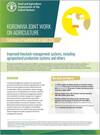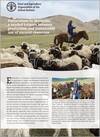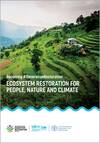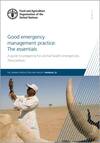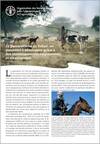Au Burkina Faso, les quatre régions les plus touchées par la crise sécuritaire – le Centre-Nord, l’Est, le Nord et le Sahel – continuent de faire face à une situation humanitaire sans précèdent. La détérioration de l’insécurité dans le pays provoque des déplacements massifs de population, un accès limité à certaines communes et entrave l’accès aux marchés et aux champs, impactant gravement les moyens d'existence et les activités de production agricole.
Year of publication: 2021Organization: Food and Agriculture Organization of the United Nations (FAO)
Topic: Conflict, Economy, Environmental services, Food security, Resilience, Social services
Language: Français
Type of document: Newletters
Geographical coverage: West Africa
This publication provides an overview of the common and unique sustainability elements of Indigenous Peoples' food systems, in terms of natural resource management, access to the market, diet diversity, indigenous peoples’ governance systems, and links to traditional knowledge and indigenous languages. While enhancing the learning on Indigenous Peoples food systems, it will raise awareness on the need to enhance the protection of Indigenous Peoples' food systems as a source of livelihood for the 476 million indigenous inhabitants in the world, while contributing to the Zero Hunger Goal.
Year of publication: 2021Organization: Food and Agriculture Organization of the United Nations (FAO), Individual authors
Topic: Food security, Indigenous knowledge, Indigenous peoples
Language: English
Type of document: Technical
Geographical coverage: Global
Parties and observers under the United Nations Framework Convention on Climate Change (UNFCCC) met in November 2020 to discuss the Koronivia Joint Work on Agriculture (KJWA) topic 2(e) on "Improved livestock management systems, including agropastoral production systems and others" This brief provides a summary of those discussions and suggests potential entry points for the KJWA going forward.
Year of publication: 2021Organization: Food and Agriculture Organization of the United Nations (FAO)
Topic: Climate change, Resilience, Social services
Language: English
Type of document: Technical
Geographical coverage: Global
This policy brief highlights the economic contribution of pastoralism at the national level, not only through the production and sale of animal-based products, but also through household self-consumption. It presents the main needs and challenges faced by the families that carry out this practice in Mongolia and highlights the need for local civil society organizations to collect and manage data relevant to the sector, paving the path for advocating for evidence-based policies.
Year of publication: 2021Organization: Food and Agriculture Organization of the United Nations (FAO), Individual authors
Topic: Climate change, Economy, Environmental services, Food security
Language: English
Type of document: Policies and legislation
Geographical coverage: Central Asia
The UN Decade on Ecosystem Restoration provides a unique opportunity to transform food, fibre and feed production systems to the needs of the 21st century, and to eradicate poverty, hunger and malnutrition. This report presents the case for why we all must throw our weight behind a global restoration effort. Drawing on the latest scientific evidence, it explains the crucial role played by ecosystems from forests and farmland to rivers and oceans, and charts the losses that result from our poor stewardship of the planet. The UN Decade runs from 2021 through 2030 and is led by the United Nations Environment Programme and the Food and Agriculture Organization of the United Nations.
Year of publication: 2021Organization: Food and Agriculture Organization of the United Nations (FAO), United Nations Environment Programme (UNEP)
Topic: Climate change, Economy, Environmental services, Land
Language: English
Type of document: Technical
Geographical coverage: Global
This international GEMP Essentials guide is meant to support the advancement of key components of emergency management as countries continue efforts to work and prepare together. It sets out in a systematic way the elements required to achieve an appropriate level of preparedness and proposes an approach to animal health emergency management inclusive of all type of events, be they caused by natural phenomenon, including not infectious events, or by accidental or deliberate human action. The guide also includes the One Health approach.
Year of publication: 2021Organization: Food and Agriculture Organization of the United Nations (FAO)
Topic: Environmental services, Social services
Language: English
Type of document: Technical
Geographical coverage: Global
Like many other economies in transition, Kyrgyzstan, Tajikistan and Uzbekistan face the dual challenge of promoting development and reducing greenhouse gas (GHG) emissions, and ruminant systems are central for achieving both goals. This study found that enteric methane and manure management are the predominant sources of emissions from cattle systems; however, the study found that regions with high GHG emissions from the cattle systems also had the highest soil carbon stocks. This is mainly due to the high apportion of carbon into the soil from manure and organic amendments. Thus, in these regions, tailored practices could likely reduce GHG emissions through practices that can increase organic carbon storage. This project was the first step in understanding the role of ruminants through advanced GHG accounting methods and serve as a basis for these countries to take on larger climate investment projects and catalyse climate action through sustainable livestock development.
Year of publication: 2021Organization: Food and Agriculture Organization of the United Nations (FAO), Individual authors
Topic: Environmental services
Language: English
Type of document: Technical
Geographical coverage: Central Asia
Cette note de politique générale met en évidence la contribution économique du pastoralisme au niveau national, non seulement par la production et la vente de produits d'origine animale, mais aussi par l'autoconsommation des ménages. Elle présente les principaux besoins et défis auxquels sont confrontées les familles qui pratiquent cette activité au Tchad et souligne la nécessité pour les organisations locales de la société civile de collecter et de gérer les données relatives à ce secteur, ouvrant ainsi la voie au plaidoyer pour des politiques fondées sur des données probantes.
Year of publication: 2021Organization: Food and Agriculture Organization of the United Nations (FAO), Individual authors
Topic: Climate change, Economy, Food security, Resilience
Language: Français
Type of document: Policies and legislation
Geographical coverage: West Africa




